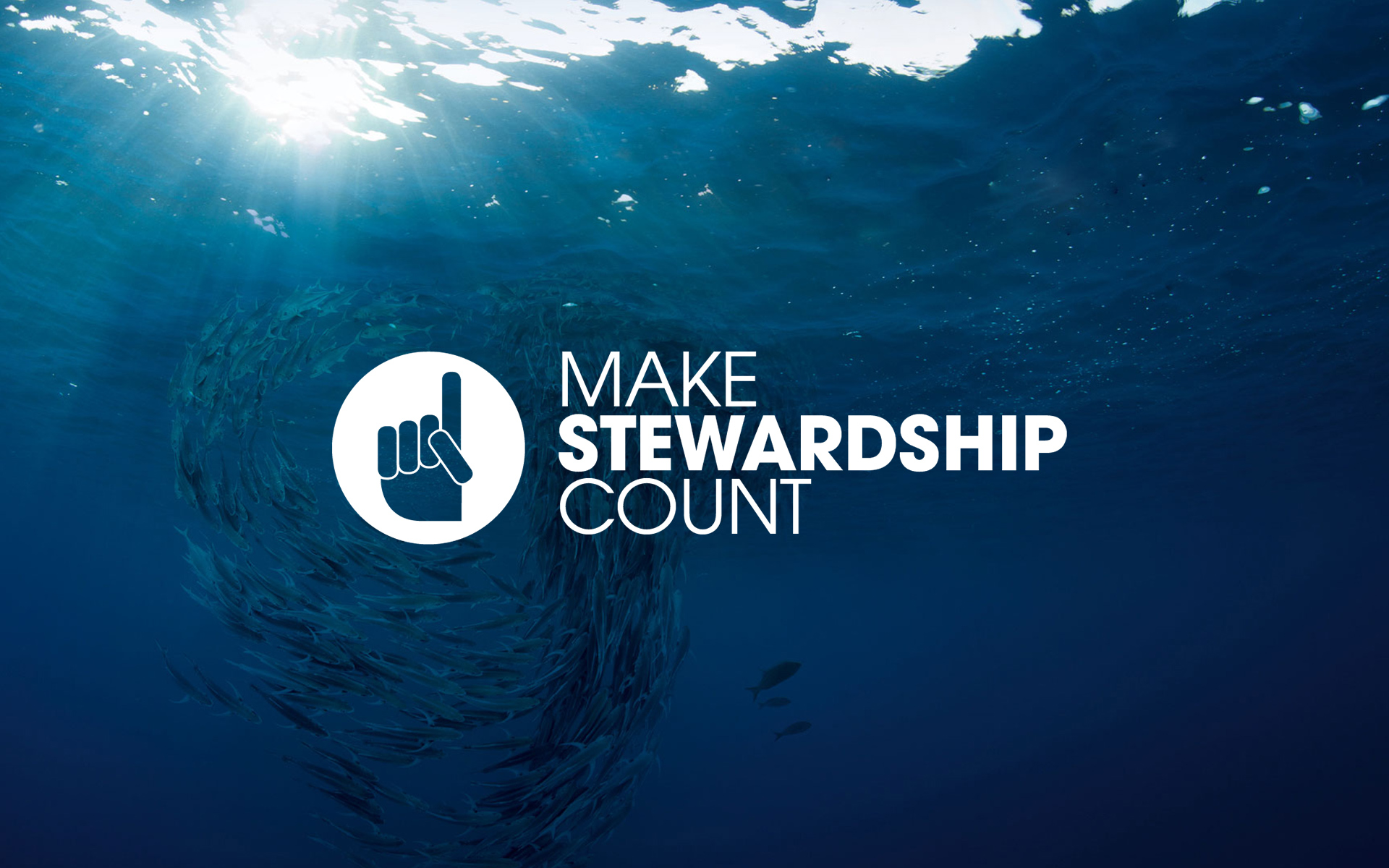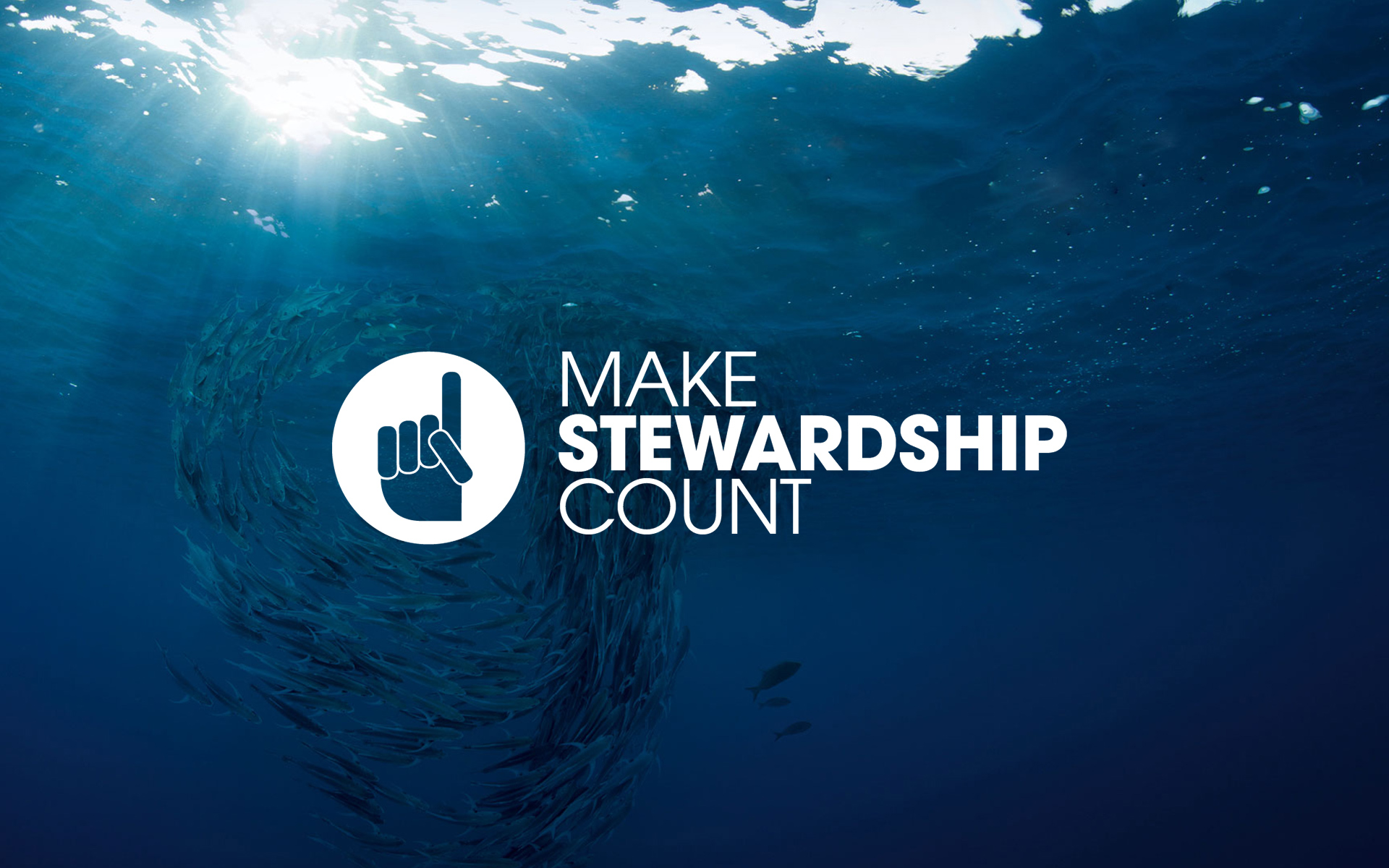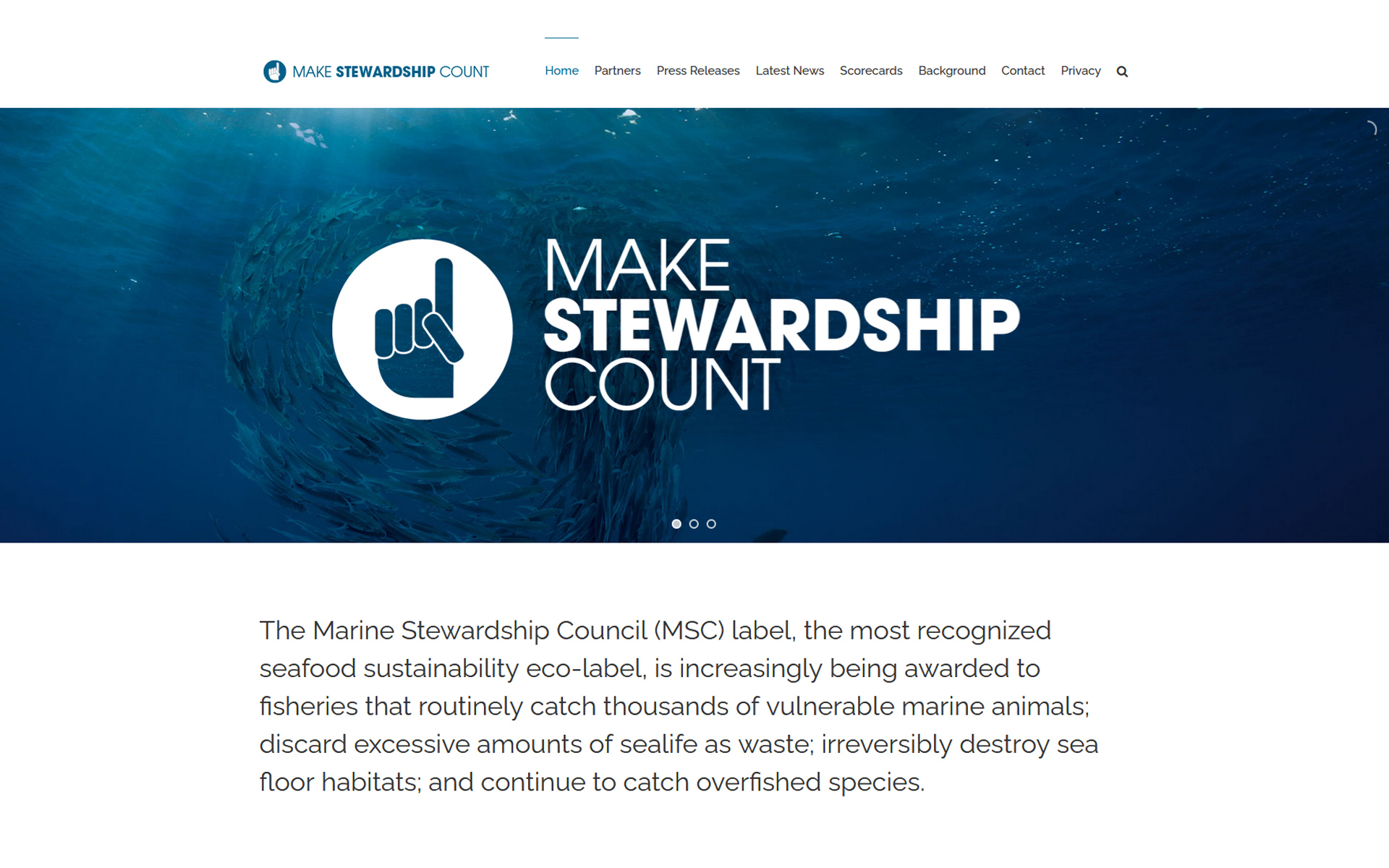

The best-known eco-label for sustainable fishing does not deliver what it promises. Call to the Marine Stewardship Council (MSC) to comply with regulations
MSC - Make Stewardship Count
Overfishing of the oceans. Species extinction. The ocean ecosystem, so vital to us, at the bottom. It will take all our efforts to bring about the necessary changes. The top priority is sustainability in everything we do.
The MSC ecolabel was founded with this in mind. It is a label that is supposed to stand for transparency and sustainable fishing and only certifies those who act according to these guidelines. Furthermore, it was supposed to create trust among consumers, and so it did not take long for it to become a kind of "gold standard" among eco-labels.
But what to do when this very label goes against its own intentions? With the aim of maximum growth, the MSC has often decided against sustainability and transparency in fisheries. Several cases have ben brought to light where fisheries have been MSC-certified that demonstrably do not operate sustainably and use extremely harmful fishing practices.
To counteract this negative development, many organizations have joined forces under the name "Make Stewardship Count". The aim is not to work against the MSC, but to enter into dialogue with it and return the label to where it once started. Because one thing is also clear: It needs more transparency and more sustainability to turn the tide on marine conservation. And labels that truly stand for these attributes can be an important building block for this.
The final chance for MSC to make a real difference on the water!
Will the Marine Stewardship Council (MSC) succeed in strengthening its Fisheries Standard now to protect ETP species, reduce the waste of marine life, eliminate shark finning and end destruction of sensitive habitats by MSC certified fisheries?
After the multi-year review the Board will decide in June whether and which parts of the draft Standard presented on February 1st and available for public consultation until April 4th will be implemented into the new Standard before publishing it towards the end of the year. Having engaged in the Fishery Standard Review (FSR) process since the start in 2018, we participated in many workshops and public consultations, wrote countless letters, …. but now it will be the last chance to ensure that MSC does the right thing this time.
As part of Make Stewardship Count and supported by many other organisations and responsible retailers we have demanded critical improvements to Principle 2 of the Standard, bycatch and ecosystem impacts and continued to request strengthening of the proposals made by the MSC thoughout the consultations as we are convinced that only a substantially improved Standard will eventually ensure that the blue label indeed delivers on it’s promise of “certified sustainable seafood” and “oceans teeming with life”.
And indeed we appreciate that the draft Standard published in February includes many good intents, such as
- to step down on finning by requiring all fisheries interacting with sharks to demonstrate having a Fins Naturally Attached (FNA) policy – without exemptions – as a prerequisite for certification
- to strengthen the protection of endangered, threatened and protected (ETP) species and require certified fisheries to minimise their mortality
- to ban the harassment of marine mammals by fishing operations such as setting net around schools of dolphins to catch the associated tuna
- to require minimum levels of independent observation as evidence requirement for scoring a fishery’s impact on ETP bycatch and sensitive habitats
This could really raise the bar, drive improvements and prevent certification of all those fisheries, which we have continued to criticise over the last years as a stakeholeder in assessments and our objections against some of those certifications – so far always without success, as the current Standard allows for all these unsustaianble fisheries being certified.
HOWEVER, unfortunately the draft Standard as published contains serveral severe loopholes which must urgently be closed prior to publication of the final Standard text later this year. If not improved this Standard once again will fail to deliver improvements on the water and fail to rebuild credibility of the former “gold standard” of sustainability labels.
In our submission to the most recent consultation in April we have, therefore, detailed our concerns and told MSC that it urgently needs to revise the draft accordingly and that it should discuss and share such a revised version with stakeholders prior to publication of the final text.
After almost five years of Standard Review it is now essential to get this Standard RIGHT THIS TIME even if thereby delaying publication of the final text for another couple of months. Keeping in mind that there will be a 3 year transition period for fisheries and additional exceptions, the new Standard will not become effective on the water prior to 2030. Specifically the following improvements need to be made to the current draft Standard in order to close the exisiting loopholes and deliver on its intent.
- The requirement to minimise catch of ETP Species or ‘Out of Scope’ Species could be a real improvement BUT by defining “Minimised” as “shall be interpreted in this context as reduced to the smallest possible level without affecting crew safety, altering the target catch level by more than 10% or negatively impacting other species or habitats” will prevent this provision from making any difference as economic reasons will continue to prevail and allow fisheries not having to shift to more selective gear or to implement effective bycatch avoidance and mitigation strategies.
- The Standard lacks important definitions as part of the Standard text providing these instead in the non binding Guidance to the Fisheries Standard. In addition and even more concerning is that throughout the Standard many important provisions are not clearly set out but continue to rely on the “expert judgement” of the assessment team. Thereby, providing the Conformity Assessment Bodies (CABs) who carry out the assessments and determine the certification of fisheries with excessive descretion in how to interpret requirements, which measures to consider adequate, and to even override the minimum levels of “independent observation” set out in the evidence requirments for scoring of bycatch and habitat impacts.
- Defining clear evidence requirements and especially the defined minimum levels required for independent observation are much appreciated, however the new Toolbox presented by MSC to do so is overly complicated and maintains substantial loopholes. While the suggested minimum precision threshold levels for independent observation are a real improvement, those are only required for scoring some of the Scoring Indicators (SIs) and no such precision thresholds are required to demonstrate compliance with fins naturally attached or scoring of compliance in Principle 3 (Management). While introducing Fins Naturally Attached as a prerequisite for certification is a milestone improvement this will not change anything on the water if compliance with an FNA policy is not independently monitored. Instead of implementing a risk based approach for the definition of required threshold levels as had been requested by Sharkproject and many other stakeholders, the Toolbox approach is a one fits all approach requiring all fisheries to fulfill the same requirements, but as a minimum independent observation thresholds must equally exist for scoring of all compliance SIs.
- As the draft Standard has not been fully developed and tested at the time of publication, major parts of it and especially parts of the Toolbox, including the proposed “precision treshold levels” were still in square brackets at the time of consultation and might be subject to change during MSC’s internal review in the Meetings of the Technical Advisory Board (TAC), the Stakeholder Advisory Council (STAC) and the Board Meeting in May / June without further public consultation of the changes. There will also be further expert meetings between MSC and CABs and possibly falso isheries, but no addiitonal public consultation or discussion with stakeholders from civil society has been planned so far.
All detailed concerns and proposed improvements are outlined in our written submission from April 3rd, 2022.
Project history
2018
Start of the Sharkproject campaign "Return to Sustainability" with an open letter to the Marine Stewardship Council (MSC)
2019
Re-naming the campaign to "Make Stewardship Count". The campaign becomes an independent society which is located in Switzerland and has many partner organisations.
2022
Written submission by Sharkproject in response to MSC's April 2022 consultation, stating that the current draft of the MSC standard needs urgent revision.
2022
Joint letter from partners and retailers (such as MIGROS) to the MSC on 13.05.2022, calling for the necessary changes in the MSC standard to be maintained and enforced even in the face of industry opposition.
Background Information
Case studies of certifications of harmful
fishing:
- A tuna fishery in Mexico deliberately sets its
nets over schools of dolphins in order to catch
a school of fish suspected to be in their vicinity.
Although the dolphins are driven out shortly
before the nets are hauled in or released by
divers, this method still often leads to serious
injuries or death of the animals and is a
permanent stress factor for the small or even
endangered stocks. The fishery was certified as
"sustainable" despite worldwide criticism and
an objection by the WWF. Recently it became
known that this very fishery even fishes in
marine protected areas where fishing is
prohibited. - The largest tuna fishery in the Western and
Central Pacific (PNA) with a catch volume of
over 1.2 million tonnes of tuna (bonito and
yellowfin tuna) is to be recertified for half of its
catch because this part is caught with a fishing
method (free nets) that causes little bycatch.
However, the fishery also uses a very harmful
version of this fishing method. In this case, so-
called FADs, artificial rafts, are set out. Many
fish seek shelter from predators under these
rafts. Among them are many young tuna, but
also silky sharks, which fall victim as bycatch
when the nets are hauled in. The exact figures
are not known because this part of the fishery
is not MSC-certified and therefore no data has
to be recorded. The fact that almost 68.000
sharks die each year as a result is not
assessed further. Not only that: Observers also
reported "finning" in over 300 cases. - A Canadian longline fishery targeting swordfish
was recently recertified, even though 100,000
sharks (mostly blue sharks) are caught as
unwanted bycatch and thrown overboard dead
or dying to catch only 20,000 swordfish
annually. At least 1,200 endangered sea turtles
are also affected as bycatch of this fishery.
Objectives
The Alliance calls on the MSC to engage in dialogue
in order to swiftly implement the demands. These
seven categories of demands cover the following
topics:
- The overall impact of the fishery to be certified
on the marine ecosystem must be considered,
taking into account both the impacts of MSC
certified fisheries and those of all other fisheries
in an area. - All fishing activities of a fishery for the target
species must be considered as part of the
assessment. - MSC-certified fisheries must not contribute to
the destruction of seabed biodiversity - The data used to certify the fishery must be
transparent and complete and verifiable by the
environmental organizations involved in the
assessment process - Requirements for certification of a fishery must
be fully met prior to the first recertification - The assessment of a fishery for the desired
certification may only be carried out by
certification agencies that are economically
independent of the fishery to be certified and
are not contracted or paid directly by the fishery
to be certified - The MSC must proactively review and maintain
the scientific standard and sustainability
objectives of the scheme
The Steering Commitee consists of:
- Shannon Arnold (Ecology Action Centre,
Canada) - Dr. CAT Dorey (Consultant (Fish, Fisheries, &
Science Communication), Australia) - Kate O'Connell (Animal Welfare Institute, USA)
Dr. Iris Ziegler (Sharkproject)
Involved partners
You can find an overview of all partners here:
https://www.make-stewardship-count.org/partners/

©
